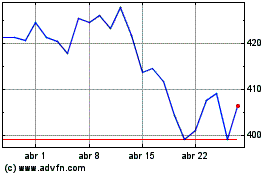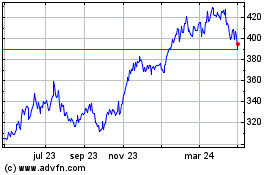By Bob Davis and Drew FitzGerald
WASHINGTON -- Seeking to blunt the dominance of China's Huawei
Technologies Co., the White House is working with U.S. technology
companies to create advanced software for next-generation 5G
telecommunications networks.
The plan would build on efforts by some U.S. telecom and
technology companies to agree on common engineering standards that
would allow 5G software developers to run code on machines that
come from nearly any hardware manufacturer. That would reduce, if
not eliminate, reliance on Huawei equipment.
Companies including Microsoft Corp., Dell Inc. and AT&T Inc.
are part of the effort, White House economic adviser Larry Kudlow
said.
"The big-picture concept is to have all of the U.S. 5G
architecture and infrastructure done by American firms,
principally," Mr. Kudlow said in an interview. "That also could
include Nokia and Ericsson because they have big U.S.
presences."
The U.S. contends Huawei has strong links to the Chinese
military, making use of its equipment a national-security risk.
Huawei has denied such links and says it operates independently of
the Chinese government.
Mr. Kudlow said Dell founder Michael Dell was a strong backer of
the project, noting that software is becoming more important as 5G
develops. Dell could also benefit by producing the servers and
other equipment that run the advanced software, said James Lewis, a
technology analyst at the Center for Strategic and International
Studies.
"Dell and Microsoft are now moving very rapidly to develop
software and cloud capabilities that will, in fact, replace a lot
of the equipment," Mr. Kudlow said. "To quote Michael Dell,
'Software is eating the hardware in 5G.'"
The effort is in a preliminary stage and still faces many
obstacles, including bringing together different companies with
varying priorities. Cellular networks use highly specialized
technology that is mostly new to generalist companies like
Microsoft and Dell.
"Talk is a good start," said Roger Entner, an analyst for
industry researcher Recon Analytics. "But in the end it needs
action. More funding will accelerate everything."
White House officials say they are taking the effort seriously
because of the potential value of 5G technology to the broader
economy.
U.S. lawmakers have proposed funding research and development
into open 5G software standards. A bipartisan group of senators in
January proposed tapping proceeds from the Federal Communications
Commission's coming spectrum license auctions to pay for research
grants into those technologies.
The administration is looking into those efforts but hasn't yet
decided whether to back them, Mr. Kudlow said.
In some ways, the U.S. effort mirrors the way China seeks to
nurture new technology. Huawei benefited enormously from Beijing's
willingness to subsidize the company and block foreign competitors.
While the U.S. won't be providing subsidies, it is protecting the
enormous U.S. market for Finland's Nokia Corp. and Sweden's
Ericsson AB as well as other non-Chinese companies.
"The Chinese don't have grounds to complain," Mr. Lewis said.
"We're doing what they do. The Chinese hate the word
reciprocity."
Industry boosters say the engineering standard will power an
"Internet of Things" in which factories, household appliances and
vehicles are connected in the way mobile phones are now. They say
5G can do for future tech startups what 4G technology did for
smartphone apps like Uber Technologies Inc. and Snapchat Inc.,
building a foundation for future innovation.
Huawei won't be easy to unseat as the global leader,
however.
Huawei is the world's top seller of telecom equipment, followed
by Nokia and Ericsson, according to market researcher Dell'Oro
Group. The Chinese company has won fans globally -- including small
rural telecom carriers in the U.S. -- for the quality of its
equipment and technical support.
Over American objections, the U.K. recently decided to permit
Huawei to build part of the country's 5G system.
Andy Purdy, Huawei's chief U.S. security officer, said American
officials shouldn't sideline the Chinese telecom giant.
"If the U.S. wants 5G hardware and software developed by a U.S.
or European company, the government should encourage companies to
begin negotiations with Huawei to license our 5G technology," Mr.
Purdy said, adding that without the company's intellectual
property, "the combined product will be 1-2 years behind the
comparable Huawei products in terms of functionality and
assurance."
Paul Triolo, head of global technology policy at the Eurasia
Group, a business consulting firm agreed that Huawei has a
formidable lead.
"The problem is you're starting late in the game to fix this
problem," Mr. Triolo said of the U.S. effort. He added that the
initiative could also threaten Nokia and Ericsson by making their
machines into commodities, Mr. Triolo said.
Representatives of Nokia and Ericsson didn't comment on the
White House initiative.
Other potential issues could slow the project. If U.S. and
European companies work separately, it could take longer to develop
world-beating technology. If they work together, it could raise
antitrust concerns.
Mr. Kudlow said he didn't believe antitrust would be an issue,
saying the companies would compete in providing 5G technology.
"We're taking a coordinating role among leading companies," he
said.
He didn't provide a specific time frame, though others in the
government have said they expect to have a system running within 18
months. Earlier, the White House considered subsidizing a new
hardware competitor to Huawei or backing a government-owned 5G
network but rejected both.
President Trump is squarely behind the effort, said Mr. Kudlow,
who is leading the initiative as director of the National Economic
Council.
"The president kept saying to me, 'Can't we just put it (5G)
under one simple infrastructure?'" Mr. Kudlow said. "We're trying
to create an American soup-to-nuts infrastructure for 5G. He kept
hearing that Huawei seems to be able to do it."
Internationally, U.S. officials have discussed their 5G
development plans to try to convince allies to ban Huawei
equipment. Huawei is deeply ingrained in countries like the U.K.
and Germany. Mr. Kudlow said he hoped the software project would
help the U.K. reverse its recent decision to permit Huawei to build
part of its 5G network.
The software development push has attracted interest from U.K.
officials who want domestic cellphone carriers to have more
suppliers to choose from other than Huawei and its Scandinavian
rivals, according to a person familiar with the matter.
At the same time that the U.S. is trying to block Huawei
overseas, the administration is split on whether U.S. companies
should continue to supply the firm, which is on a Commerce
Department blacklist.
The Defense Department recently opposed a Commerce rule that
would close a loophole allowing U.S. firms to continue selling
computer chips and other products that aren't deemed sensitive from
a national-security perspective.
The Pentagon argued that if U.S. companies lose Huawei as a
customer, they will have fewer profits to pour into research and
development.
Mr. Kudlow signaled that he was aligned with the Pentagon view.
"We don't want to put our great companies out of business; the
president is a strong believer in that," he said. "But on the other
hand, we are very aware that Huawei is a threat to our national
security."
Write to Bob Davis at bob.davis@wsj.com and Drew FitzGerald at
andrew.fitzgerald@wsj.com
(END) Dow Jones Newswires
February 04, 2020 18:08 ET (23:08 GMT)
Copyright (c) 2020 Dow Jones & Company, Inc.
Microsoft (NASDAQ:MSFT)
Gráfica de Acción Histórica
De Mar 2024 a Abr 2024

Microsoft (NASDAQ:MSFT)
Gráfica de Acción Histórica
De Abr 2023 a Abr 2024
